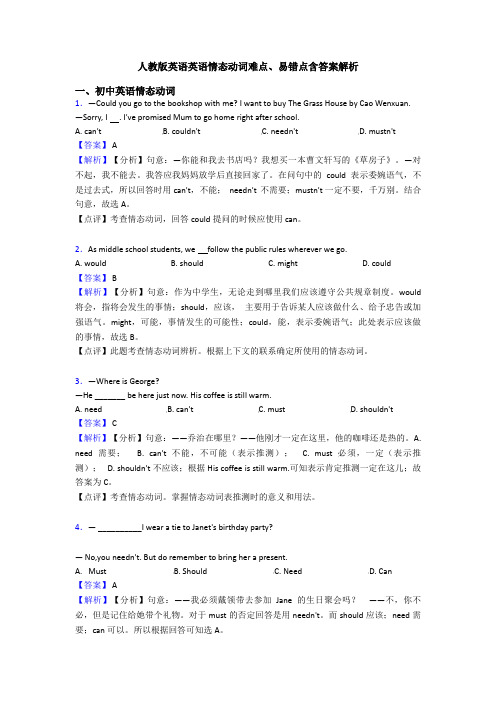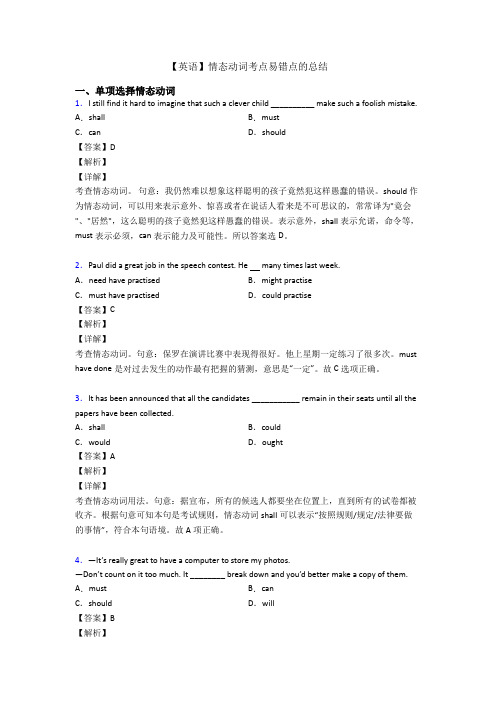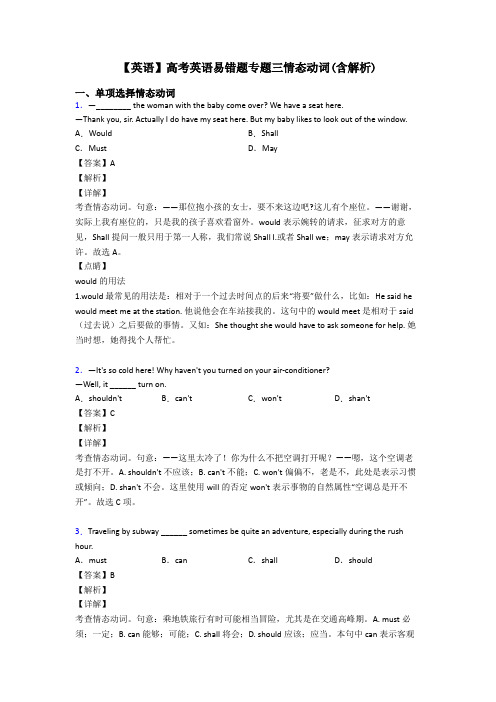【英语】英语情态动词易错剖析
2023年初中英语语法之常考情态动词归纳汇总及易错分析

2023年初中英语语法之常考情态动词归纳汇总及易错分析一、can和could1、can的用法(1)表示体力和脑力方面的能力。
(2)表示对现在的动作或状态进行主观的猜测,主要用在否定句和疑问句中(3)表示可能性,理论上的可能性,意为“有时候可能会”,可用于肯定句(4)表示允许,意思与may接近(5)表示说话人的推测、怀疑、惊异、猜测或不肯定等,主要用于否定句、疑问句或感叹句中。
(6)can的特殊句型cannot...too / enough表示“无论怎么、也不过分”。
“越、越好”cannot but+ do sth.表示“不得不,只好”2、could的用法( 1)表示能力,指的是过去时间。
( 2)表示允许,指的是过去时间。
(3)表示可能,可以指过去时间,也可以指现在时间,表示语气缓和(4)委婉客气地提出问题或陈述看法,指的是现在时间。
主要用于疑问句,回答时用can。
3、can与could的区别can表推测时只用于否定句和疑问句( could无此限制)。
couldn’t的可能性比can’t小小。
4、can与be able to的区别(1)现在时 : 无区别,但后者不常用(2)完成时;can没有完成时,此时要用have( has,had ) been able to。
( 3)将来时: can没有将来时,要用will be able to。
(4)过去时:could表示一般能力,was/were able to 表示在具体场合通过努力成功做成某事的能力。
、may 和might1、may的用法(1)表示询问或说明一件事可不可以做(2)表示一件事或许会发生或某种情况可能会存在,通常用在肯定句和否定句中注意:表示可能性时,can’t语气强,表示“不可能”,may not 语气弱,表示“可能不"2、might的用法(1)表示询问或允许,指的是过去时间。
(2)表示可能发生的事,可以指过去时间,也可以指现在时间,语气更加不肯定,可能性比may小一些。
备战2024年高考英语考试易错点09 情态动词和虚拟语气(4大陷阱)(解析版)

易错点09情态动词和虚拟语气目录01易错陷阱(4大陷阱)02举一反三【易错点提醒一】情态动词基本用法易混易错点【易错点提醒二】情态动词表判断推测易混易错点【易错点提醒三】情态动词后+have done易混易错点【易错点提醒四】虚拟语气易混易错点03易错题通关易错陷阱1:情态动词基本用法易混易错点。
【分析】功能:情态动词不能单独作谓语,后跟动词原形共同构成谓语。
形式:情态动词没有人称和数的变化。
否定形式是多数情态动词的否定式是在情态动词的后面加not。
时态:个别情态动词有现在式和过去式两种形式,过去式用来表达更加客气、委婉的语气。
位置:情态动词在谓语之前;谓语动词前若有助动词,则在助动词之前。
疑问句中在主语之前。
【高频考点】1.can/could表能力、请求、可能性(表示可能性用于否定句及疑问句中);特殊句型:can not...too.../enough(再怎么……也不过分)、can't help but do sth.(不得不做某事)、can't wait to do sth.(迫不及待地做某事)。
2.may/might表较小的可能性;表示请求许可以及祝愿。
句型和搭配:may/might as well do表示“还是……好;最好……”;may well do表示“很可能”;may可以用来表示祝愿,用“may+主语+动词原形”结构。
May you succeed.祝你成功。
3.must表示非常肯定的推测;表“偏要;非要……不可”;mustn't意为“禁止”,表示“不必”应用needn't。
4.shall的用法用于第二、三人称的陈述句中,表命令、警告、许诺或威胁等,语气强于should;用于第一、三人称的疑问句中,表示征询意见。
5.should/ought toshould表责任、义务、劝告、建议等,意为“应该”,还可表出乎意料的语气,意为“竟然”;ought to表义务或责任,意为“应该”。
人教版英语英语情态动词难点、易错点含答案解析

人教版英语英语情态动词难点、易错点含答案解析一、初中英语情态动词1.—Could you go to the bookshop with me? I want to buy The Grass House by Cao Wenxuan.—Sorry, I . I've promised Mum to go home right after school.A. can'tB. couldn'tC. needn'tD. mustn't【答案】 A【解析】【分析】句意:—你能和我去书店吗?我想买一本曹文轩写的《草房子》。
—对不起,我不能去。
我答应我妈妈放学后直接回家了。
在问句中的could表示委婉语气,不是过去式,所以回答时用can't,不能;needn't 不需要;mustn't一定不要,千万别。
结合句意,故选A。
【点评】考查情态动词,回答could提问的时候应使用can。
2.As middle school students, we follow the public rules wherever we go.A. wouldB. shouldC. mightD. could【答案】 B【解析】【分析】句意:作为中学生,无论走到哪里我们应该遵守公共规章制度。
would 将会,指将会发生的事情;should,应该,主要用于告诉某人应该做什么、给予忠告或加强语气。
might,可能,事情发生的可能性;could,能,表示委婉语气;此处表示应该做的事情,故选B。
【点评】此题考查情态动词辨析。
根据上下文的联系确定所使用的情态动词。
3.—Where is George?—He _______ be here just now. His coffee is still warm.A. needB. can'tC. mustD. shouldn't【答案】 C【解析】【分析】句意:——乔治在哪里?——他刚才一定在这里,他的咖啡还是热的。
(英语)高考英语易错题专题三情态动词(含解析).docx

(英语)高考英语易错题专题三情态动词(含解析 )一、单项选择情态动词1.I often felt troubled in my teens and my grandma ________ comfort me, saying“ Life is like that, dear”.A. would B. might C. should D. must【答案】A【解析】【解】考情。
句意:在我十几的候,我常感到,我的奶奶会安慰我,“生活就是,的”。
此是would+ 原形,表示“ 去是做某事”。
故A。
2.What a pity! Considering his ability and experience, he ___________ it better.A. need have done B.must have doneC. can have done D. might have done【答案】 D【解析】【解】考虚气中的情。
句意:真憾啊!考到他的能力和,他也可以做得更好。
can have done 少使用此构,表示去行的疑;用于疑句意“ 道真的做了”,表示疑; need have done 需要做某事,上却未做(表示虚气);must have done 一定做了某事(表示去生的事情的肯定推);might have done 表示生的事情的推,意思是“可能已”或“也已”,用于肯定句中。
故 D 正确。
【点睛】本是高考必考考点,一定要牢句型意思。
must have done 去肯定做了某事。
shouldhave done 本做而未做。
can ’ t have done去不可能做了某事; shouldn ’ t have done本不做而做了。
need have done 本有必要做某事而没做;needn’t have done本没有必要做某事;注意没有mustn’t have done的形式。
3.— It ’ s already 11 o’ clock , and he ______ have been here half an hour ago.—Maybe he got caught in the rain.A. must C. may B.ought to D. can【答案】B 【解析】【解】考情。
【英语】情态动词考点易错点的总结

【英语】情态动词考点易错点的总结一、单项选择情态动词1.I still find it hard to imagine that such a clever child __________ make such a foolish mistake. A.shall B.mustC.can D.should【答案】D【解析】【详解】考查情态动词。
句意:我仍然难以想象这样聪明的孩子竟然犯这样愚蠢的错误。
should 作为情态动词,可以用来表示意外、惊喜或者在说话人看来是不可思议的,常常译为"竟会"、"居然",这么聪明的孩子竟然犯这样愚蠢的错误。
表示意外,shall表示允诺,命令等,must表示必须,can表示能力及可能性。
所以答案选D。
2.Paul did a great job in the speech contest. He many times last week.A.need have practised B.might practiseC.must have practised D.could practise【答案】C【解析】【详解】考查情态动词。
句意:保罗在演讲比赛中表现得很好。
他上星期一定练习了很多次。
must have done是对过去发生的动作最有把握的猜测,意思是“一定”。
故C选项正确。
3.It has been announced that all the candidates ___________ remain in their seats until all the papers have been collected.A.shall B.couldC.would D.ought【答案】A【解析】【详解】考查情态动词用法。
句意:据宣布,所有的候选人都要坐在位置上,直到所有的试卷都被收齐。
根据句意可知本句是考试规则,情态动词shall可以表示“按照规则/规定/法律要做的事情”,符合本句语境。
【英语】高考英语易错题专题三情态动词(含解析)

C.won'tD.shouldn't
【答案】D
【解析】
【详解】
考查情态动词。句意:我们不应该把拥有洁净的饮用水看作是理所当然的。也许有一天,我们会用完它。shouldn't“不应该”,符合句意。needn't不必;can't不可能;won't将不。故选D。
9.It_____ have been Tom that parked the car here, as he is the only one with a car.
12.One of our rules is that every student _______ wear school uniform while at school.
A.mightB.could
C.shallD.will
【答案】C
【解析】
【详解】
考查情态动词辨析。句意:我们其中一条规则要求每个学生在校期间都要穿校服。shall可以表示“命令,警告,强制要求;允诺;法律,规定要做……”,结合句意可知C正确。
I guess the poet would have been about twenty when she wrote her first poem.
13.It has been announced that all the candidates ___________ remain in their seats until all the papers have been collected.
A.shallB.could
C.wouldD.ought
【点睛】
would的用法
(英语)初中英语动词基本形式易错剖析及解析
(英语)初中英语动词基本形式易错剖析及解析一、动词基本形式1.The girl is greatly interested in the song. The lyrics of it her thoughts and feelings.A. expressB. discussC. expectD. imagine【答案】 A【解析】【分析】句意:那个女孩对那首歌很感兴趣。
它的歌词表达了她的想法和情感。
A. 表达,B. 讨论,C. 期待,D. 想象,根据句意可知歌词表达了她的想法和情感,故选A。
【点评】本题考查动词辨析。
熟记这些动词的意义和用法。
2.—Listen, the music sweet.—It's Yesterday Once More, my favorite.A. soundsB. smellsC. feelsD. looks【答案】A【解析】【分析】句意:—听,这音乐听起来很甜美。
—是昨日重现,我最爱的音乐。
music“音乐”应该是“听起来”很甜美。
sound符合句意。
故答案为A。
【点评】考查动词辨析,注意感官动词的用法。
3.The girl has a boyfriend Bill.A. callB. calledC. is calledD. is calling【答案】 B【解析】【分析】句意:那个女孩有个名叫比尔的男朋友。
此题考查过去分词做定语。
called名叫......的。
故选B。
【点评】考查动词的不同形式。
4.My sister used to _____ thin and short, but now she is tall.A. beB. wasC. hasD. have【答案】 A【解析】【分析】根据thin and short又瘦又矮,可知此处填动词be。
used to do sth.过去常常做某事。
故选A。
【点评】考查动词原形。
5.—It's going to rain. Remember to __________ your umbrella with you when you go to school, dear.—All right, Mum. Bye!A. takeB. buyC. put【答案】 A【解析】【分析】句意:——要下雨了,去上学的时候记得带一把伞哦。
(新)英语语法易错知识点助动词情态动词(详解)
(新)英语语法易错知识点助动词情态动词(详解)助动词与情态动词1. 'd不一定代表had2. 代动词do也应随句子要求进行人称和时态的变化3. 有些倒装句里需加进助动词do,does或did4. 否定词not应放在情态动词或第一助动词之后5. 以Don't you…开首的祈使句不可用do not you代替to后面不可接进行式或完成式6. have got to后面不可接进行式或完成式7. can与be able to不可用在同一个谓语里8. must和have to用法有区别。
9. 在肯定句里could不可用来表示过去某一特定场合的“能力”10. be able to后面不可接不定式的被动式11. may(might) 表示“可能”时不可用在疑问句中12. mustn't不可用来表示“不必”13. need作实义动词和作情态动词时的用法不一样14. need和dare作情态动词时,通常不用于肯定句或肯定回答15. must,need,dare和ought to作情态动词时没有其过去时形式16. 在非间接引语里might not不可表示“不许可”17. 用情态动词表示现在对过去发生的事的看法应该用情态动词+完成不定式18. 在回答情态动词+完成不定式的结构的句子时,答句里要在情态动词后加have19. be used to与used to的用法不同20. 不可用I shall代替I wi11来表示意愿21. 表示将来或意图的would的肯定式只能用于从句22. be to可以表示情态动词的意义正式开始学习1. 'd不一定代表had。
【错例】They'd like to go before sunset,hadn't they?【改正】改hadn't为wouldn't。
【句意】他们很想在日落之前去,是吗?【解释】'd可以代表had或would,'s可以代表is或has,要注意从句意上进行区别。
语法情态动词的常见错误分析
语法情态动词的常见错误分析语法情态动词在英语写作中起到了重要的作用,它能够表达说话者的意愿、推测、可能性等信息。
然而,由于语法情态动词的特殊性,很容易出现错误使用的情况。
本文将分析一些常见的语法情态动词错误,并提供相应的纠正措施,以帮助读者更好地运用这些动词。
1.情态动词与动词不一致情态动词后面的动词应该使用原形,不加“-s”结尾。
然而,在写作中常常出现情态动词与动词不一致的情况。
例如:- 错误:She musts study hard for the exam.- 正确:She must study hard for the exam.纠正该错误的方法是注意情态动词后面使用动词的原形,不要加任何后缀。
2.情态动词与助动词混淆有些情态动词在使用时容易与助动词混淆。
例如,“have to”是常用的情态动词,表示“必须”,而“have been”是助动词,表示“已经”。
然而,在实际写作中,很容易将两者混淆。
例如:- 错误:I have to been to New York last year.- 正确:I have been to New York last year.纠正该错误的方法是仔细区分情态动词与助动词的用法,注意上下文提供的时间信息。
3.情态动词的时态错误除了与助动词混淆外,情态动词的时态也容易被错误使用。
一般情况下,情态动词本身不具备时态,而是通过后面的动词来表示。
例如:- 错误:She will can help you with the project.- 正确:She will be able to help you with the project.纠正该错误的方法是注意情态动词本身不受时态的影响,根据上下文选择合适的动词来表示时态。
4.情态动词的双重否定情态动词在表达否定意义时,不能与其他否定词连用,否则会产生双重否定的错误。
例如:- 错误:I don't have no time to go shopping.- 正确:I don't have any time to go shopping.纠正该错误的方法是注意情态动词本身已经包含否定意义,不需要再加其他否定词。
英语情态动词考点易错点的总结含解析
英语情态动词考点易错点的总结含解析一、选择题1.If you buy your mum an iRobot floor cleaner, she ________ sweep the floor every day. A.can’t B.mustn’t C.needn’t D.shouldn’t2.To my joy, we_________ go to the bank. Mary has lent us some money.A.shouldn’t B.needn’t C.couldn’t D.wouldn’t3.Our Chemistry teacher always tells us we ________ be too hardworking before the exams. A.mustn’t B.shouldn’t C.needn’t D.can’t 4.—Dad, must we wait until the light becomes green?—Yes, I am afraid we ________. That’s the traffic rule.A.may B.can C.have to D.need5.—________ you give me a hand? I can’t put up the poster by myself.—No problem.A.Could B.Should C.Need D.Must6.— Is Lang Lang going to perform at Art Center this Friday?— Yes. It ________ be him. He has been here for three days.A.might B.must C.mustn’t D.may7.You'd better __________ hard from now on, __________ you will fail the exam.A.work; and B.working; or C.working; and D.work; or 8.—Where is Tom? I am considering ________ him about the result of the exam.—Oh. You ________. He has known it already.A.to tell; can't B.telling; needn't C.tell; mustn't D.told; shouldn't 9.When you visit a museum, some instructions should ________ and we’d better not ________ them.A.pay attention to; be against B.be paid attention; againstC.be paid attention to; against D.be paid attention to; be against10.I ________ hear you clearly. Would you please repeat it?A.mustn’t B.can’t C.needn’t D.shouldn’t 11.— Mom, must I clean my room now?— No, you ________. You can do it after dinner.A.needn’t B.mustn’t C.shouldn’t D.can’t 12.—Who’s the man over there? Is that Mr. Black?—It ________ be him. Mr. Black is much taller than that man.A.may B.must C.can’t D.mustn’t13.It’s amazing that the pen ________turn voice into text with few mistakes.A.can B.must C.may D.need14.—How beautiful the winter jasmines (迎春花) are!—Yes. These golden-yellow flowers ________ be widely seen in my city in March.A.must B.can C.would D.should15.— Zoe, what do you think is the greatest advantage of shopping online?— At least I ______ spend much time going from shop to shop.A.shouldn’t B.can’t C.needn’t D.mustn’t 16.Please don't make so much noise. I ________ hear the speaker very well.A.needn't B.can't C.shouldn't D.mustn't17.---Will you be back early this evening?---Yes, but I ________ be a little late. Our boss sometimes has extra work for us.A.may B.must C.need D.will18.We’ve discussed every detail of this plan and have got everything ready. But still something __________ go wrong. We still have to be very careful.A.must B.should C.would D.may 19.—Shall we go camping this summer holiday?—Nothing________be better.A.should B.could C.must D.may20.My bike was broken yesterday,so I____walk home.A.might B.had to C.must D.could 21.—Would you please________in that way? That’s not safe!—Sorry. I won’t do it any more.A.not driving B.not to drive C.no driving D.not drive 22.Dr. Zhong Nanshan once said, "To prevent the spread of this disease, we________never be too careful."A.can B.may C.must D.should 23.—Will your mother be at home this Saturday?—Hard to say. She _______go to the countryside to see my grandparents.A.must B.may C.can D.would 24.Don’t cross the road until the traffic lights turn green. A car_______hit you.A.need B.may C.should D.must25.A lot of online resources ________ be used either by teachers at school or parents at home. A.can B.should C.need D.must26.Most young people like shopping online because they ________ spend much time going from shop to shop.A.needn’t B.can’t C.mustn’t D.shouldn’t 27.—Could I join you in the programme?—Sorry, you ________. You are too young.A.shouldn’t B.mustn’t C.can’t D.needn’t 28.—Who is singing next door? It sounds like a young girl’s voice.—It _________ be Jane. But she seldom sings English songs.A.need B.must C.may D.can29.To avoid ________, we’d better ________ the parents’ meeting online.A.gather; hold B.gathering; hold C.gather; holding D.to gather; to hold 30.—I must go to school today, ________?—No, you ________.You can go as soon as you get well.A.mustn’t I;needn’t B.needn’t I;needn’tC.mustn’t I;mustn’t D.needn’t I;mustn’t31.—How do you like my new dress?—Well, if I ________ say, it is not suitable for you.A.may B.must C.have to D.should32.— Excuse me, could you tell me where the Nanjing Brocade Museum is?—Go along this road for five minutes. You ________ miss it. It’s a huge building.A.mustn’t B.can’t C.needn’t D.shouldn’t 33.—Must the children leave at six tomorrow morning?—No, they _______. They can have more time to get ready for the trip.A.can’t B.needn’t C.mustn’t D.may not 34.—Why didn’t you tell it to me earlier?— Why ________ I? I want to have my own secret.A.can B.may C.should D.shall35.A hard-working man ________ become a great scientist, but a great scientist ________ be a hard-working man.A.can’t; can B.may not; must C.can’t; must D.may not; can 36.According to the rule, used batteries ________ be dropped in the red bin for harmful wastes. A.may B.would C.should D.might37.—Will my car be ready by the end of the day?—It ________ be, sir. I’ll call if there’s any problem.A.must B.could C.shall D.should38.We've discussed every detail of this plan and have got everything ready. But still something ________ go wrong. We still have to be very careful.A.must B.should C.would D.may39.—Is it really necessary for me to go shopping with a mask on?—I’m afraid you ________ in public. It is not only to protect yourself but also to protect others. A.must B.should C.can D.need40.—Will Jim come to Yangzhou for a holiday?—He ________come and it depends on how much homework he will have.A.may B.should C.must D.need41.I think all the students love the weekends because, to them, they ________ get up early on Saturdays or Sundays.A.mustn’t B.don’t need C.needn’t D.can’t42.—Is it usually warm in Yancheng in May?—Yes. But it _______ be rather cold sometimes.A.must B.should C.would D.can43.When people are waiting at the zebra crossing, cars and buses ________ wait and let them go first.A.must B.may C.can D.need 44.—Shall I tell him the change of the time right now?—I’m afraid you ________, otherwise he will be late for the meeting.A.can B.may C.must D.need 45.—Seventy dollars for such a dress! You ________ be joking!—I’m serious. It’s made of silk from Hangzhou.A.must B.need C.will D.can 46.—Excuse me. I haven’t finished reading the book yet. May I keep it a bit longer?— Sorry, you ________. You must return it on time.A.needn’t B.can’t C.won’t D.shouldn’t 47.Cars ________ give way to walkers on some roads in Binhai, or the drivers will be fined. A.may B.will C.can D.must 48.—Could you tell me how to renew the library books?—With pleasure. You ________ come to our desk every time. It’s easier to renew them online. A.can’t B.mustn’t C.needn’t D.shouldn’t 49.—The article says that a person’s animal sign decides his personality.—You ________ read it for fun, but don’t believe in that.A.can B.must C.shouldn’t D.needn’t50.You _________ smoke here! Look at the sign. It says "No smoking".A.needn't B.mustn't C.can D.may【参考答案】***试卷处理标记,请不要删除一、选择题1.C解析:C【详解】句意:如果你给你妈妈买一台扫地机器人,她就不必每天扫地了。
- 1、下载文档前请自行甄别文档内容的完整性,平台不提供额外的编辑、内容补充、找答案等附加服务。
- 2、"仅部分预览"的文档,不可在线预览部分如存在完整性等问题,可反馈申请退款(可完整预览的文档不适用该条件!)。
- 3、如文档侵犯您的权益,请联系客服反馈,我们会尽快为您处理(人工客服工作时间:9:00-18:30)。
【英语】英语情态动词易错剖析一、单项选择情态动词1.— Mum, little Ray broke his toys again!—It doesn't matter. You see, accidents _____happen.A.shall B.should C.must D.will【答案】D【解析】【详解】考查情态动词辨析。
句意:——妈妈,小雷又弄坏了他的玩具。
——没事的,你看,意外总会发生。
A. shall将要,会;B. should应当;C. must必须;D. will总是。
Will可以表示习惯,意思为“惯于,总是”。
故D选项正确。
【点睛】will/would是情态动词,其表达的意思如下。
(1)表示意志或意愿:决心,愿意,……好吗?We will do our best to save the child. 我们会尽力抢救这个孩子。
I told her to stop crying, but she just wouldn’t listen. 我叫她别哭,可她就是不愿听。
注:表示请求、建议或征求对方意见时,用Would you…? 比用Will you…?更婉转。
如:Will/Would you please keep the door open? 请让门开着好吗?Will/Would you go with me? 你愿意和我一起去吗?(2)表示真理或习惯:惯于,总是。
如:Oil will float on water. 油总是浮在水面上。
She will listen to music alone in her room for hours. 她独自在房间里听音乐,一听往往就是几小时。
He would get up early when he lived in the country. 他住在乡下时总是早起。
(3)表示要求:一定,必须。
如:You will report to me afterward. 你稍后一定要向我报告。
(4)表示猜测:可能,大概。
如:This will be the house you’re looking for. 这大概就是你找的那所房子了。
(5)表示功能:能。
如:This auditorium will/would seat one thousand people. 这个礼堂能容纳一千人分析句子可知,本句中的will表示习惯,意思为“惯于,总是”且符合语境。
故D选项正确。
2.What a pity! Considering his ability and experience, he ___________ it better.A.need have done B.must have doneC.can have done D.might have done【答案】D【解析】【详解】考查虚拟语气中的情态动词。
句意:真遗憾啊!考虑到他的能力和经验,他也许可以做得更好。
can have done较少使用此结构,表示对过去行为的怀疑;用于疑问句时意为“难道真的做了吗”,表示怀疑;need have done需要做某事,实际上却未做(表示虚拟语气);must have done一定做了某事(表示对过去发生的事情的肯定推测);might have done表示对发生过的事情的推测,意思是“可能已经”或“也许已经”,用于肯定句中。
故D正确。
【点睛】本题是高考必考考点,一定要牢记句型意思。
must have done过去肯定做了某事。
should have done本应该做而实际未做。
can’t have done过去不可能做了某事;shouldn’t have done 本不应该做而实际做了。
need have done本有必要做某事而没做;needn’t have done本没有必要做某事;注意没有mustn’t have done的形式。
3.According to a newly released regulation on online video services, no one _____ generate, release or spread fake news or information by using such technologies.A.can B.shall C.will D.may【答案】B【解析】【详解】考查情态动词。
句意:根据最新发行的关于网络视频服务的规章,任何人都不可以使用此类技术生成、发行或者传播虚假消息。
A. can 能够,有时会;B. shall 一三人称表示征求对方意见;二三人称陈述句,表示允诺、威胁、恐吓或法律条文的规定。
C. will 意愿;D. may 也许,可能。
根据前面的regulation(规定)可知,本题选shall更加合理。
故选B。
4.Our English teacher is considerate,helpful,and warm-hearted,but sometimesshe________________ be angry at our silly mistakes.A.should B.mustC.can D.shall【答案】C【解析】【详解】考查情态动词。
句意:我们的英语老师很体贴、乐于助人、热心肠,但有时她可能为我们愚蠢的错误而发火。
can表示一种客观的可能性,但不一定会发生,故C项正确。
5.—It’s already 11 o’clock , and he ______ have been here half an hour ago.—Maybe he got caught in the rain.A.must B.ought toC.may D.can【答案】B【解析】【详解】考查情态动词。
句意:已经11点了,他半小时前就该到了。
A. must have done必定做了…(表示对过去的推测);B. ought to have done 本应该做的;C. may have done可能已经做过某事;D. can have done本来可以做的(但没有做),根据题意,故选B。
6.—Daddy, would you please buy me an iPhoneX?—If you can pass this midterm examination, you __________ have one as a reward.A.must B.needC.would D.shall【答案】D【解析】【详解】考查情态动词。
句意:爸爸,你可以给我买部iPhone X吗?--如果你通过考试,你就会得到一部作为奖励。
A. must一定;B. need必要;C. would将,会;D. shall会。
根据语境可知,这句话是父亲对子女的允诺,故选D。
【点睛】shall的用法。
1. shall作为助动词,一般用于第一人称Ⅰ和We,表示一个将来的动作,构成将来时态。
shall后面接动词原形。
例如:(1)I shall think it over and Let you know my idea.我将考虑一下此事,然后告诉你我的想法。
(2)We shall have a good time in the park.我们在公园里会玩得很高兴的。
2. shall用于第一人称,表示征求对方的意愿。
如:What shall we do this evening?3. shall用于第一、第三人称疑问句中,表示说话人征求对方的意见或向对方请示。
如:Shall we begin our lesson? When shall he be able to leave the hospital?4. shall用于第二、第三人称,表示说话人给对方命令、警告、允诺或威胁。
如:You shall fail if you don't work harder. (警告) He shall have the book when I finish reading. (允诺)He shall be punished. (威胁)比如本题,根据语境可知,这句话是父亲对子女的允诺,故选D。
7.Students ____ remain in their seats until all the papers have been collected according to the regulation.A.would B.shall C.will D.could【答案】B【解析】考查情态动词。
句意:学生们必须呆在自己的座位上,直到所有的试卷都被收回。
根据句意,“学生们呆在自己的座位上”是一项规定。
shall 可表示某种规定或义务,用于第二、三人称的句子中。
而其他情态动词无此用法。
故正确答案为B。
8.I love the weekend, because I ________ get up early on Saturdays and Sundays. A.mustn’t B.need n’tC.wouldn’t D.shouldn’t【答案】B【解析】【详解】考查情态动词。
句意:我喜欢周末,因为周六周日不必早起。
A. mustn’t不能,禁止;B. needn’t不必;C. wouldn’t不会;D. shouldn’t不应该。
此处表示“不必”,故B项正确。
9.—You rang me up at about 10:00 last night, didn't you?—No, I didn't phone you. It someone else.A.must have been B.could be C.must be D.could have been 【答案】A【解析】【详解】考查情态动词+have done。
句意:“昨晚10点左右你给我打了电话,是吗?”“不,我没给你打电话。
一定是别人干的。
” must have done 是对过去发生的动作最有把握的猜测,意思是“一定”,结合语境可知,我没有打电话给你,因此猜测一定有别人给你打了电话。
故选A 项。
10.he law is equally applied to everyone. No one _______ be above it.A.shall B.mustC.may D.need【答案】A【解析】【详解】考查情态动词。
句意:法律面前人人平等。
没有人能凌驾于法律之上。
A. shall用于第二、第三人称,则含有命令、警告、允诺或威胁的语气。
B. must(必须,一定)用于肯定句。
C. may(可以,能够)表允许时一般不与第三人称连用。
